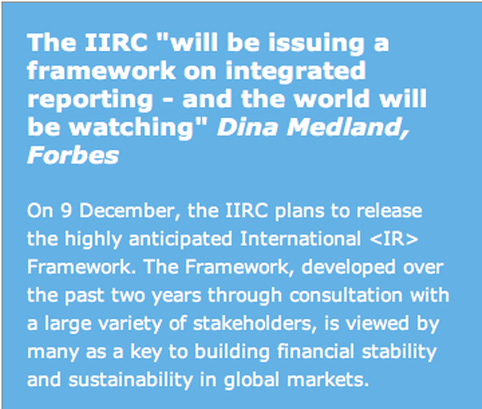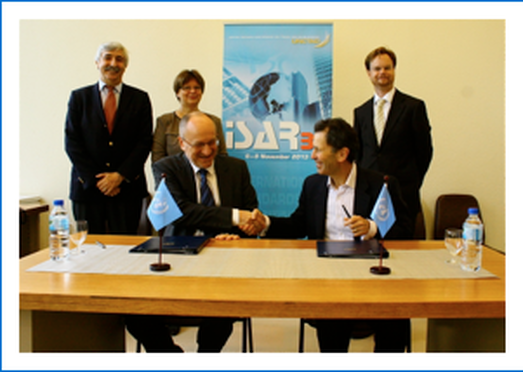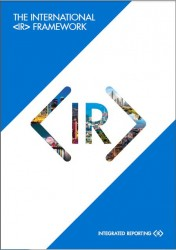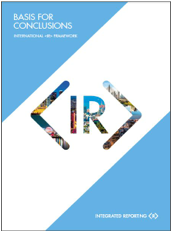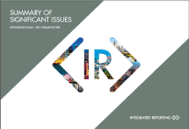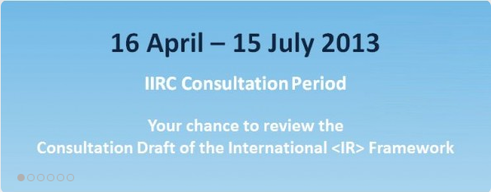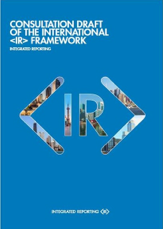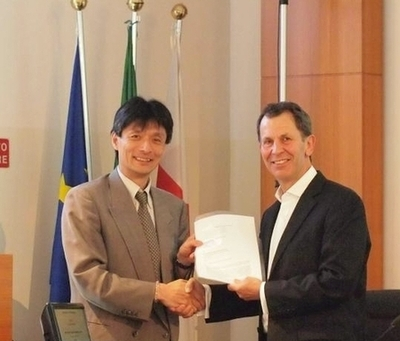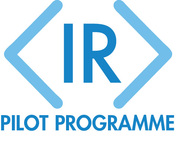|
The IIRC is seeking to ensure there is appropriate training available in the market to enable effective adoption of Integrated Reporting <IR>. Therefore Total Eco Management and Torres Training Consultancy have joined together to offer this innovative and practical approach to Integrated Reporting One Day course. The course will offer the following topics:
Who should attend This integrated reporting workshop is for general managers at a mid or senior level who want to move beyond appreciating the business case for an integrated report to maximising competitive advantage through the strategy and integrated reporting process. It will also be of value to sustainability and integrated reporting practitioners, and users of sustainability and integrated reports, including investors, government, regulators and NGOs. The above mentioned training course will be offered both as an open course and ‘in house training’ to organisations that are planning to do an integrated report. Meet the trainers <IR> FRAMEWORK
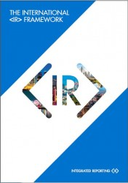
INTERNATIONAL <IR> FRAMEWORK RELEASED WITH BUSINESS AND INVESTOR SUPPORT 09.12.13
The release of the International Integrated Reporting (<IR>) Framework on Monday 9 December 2013, marks an important milestone in the market-led evolution of corporate reporting. It follows a three-month global consultation led by the International Integrated Reporting Council (IIRC) earlier this year, which elicited over 350 responses from every region in the world, the overwhelming majority of which expressed support for <IR>. <IR> applies principles and concepts that are focused on bringing greater cohesion and efficiency to the reporting process, and adopting “integrated thinking” as a way of breaking down internal silos and reducing duplication. It improves the quality of information available to providers of financial capital to enable a more efficient and productive allocation of capital. Its focus on value creation, and the ‘capitals’ used by the business to create value over time, contributes towards a more financially stable global economy and is a force for sustainability. The Framework will be used to accelerate the adoption of <IR> across the world, where it is currently being trialled in over 25 countries, 16 of which are members of the G20, the group of nations focused on strengthening the global economy. Commenting on the release of the Framework, IIRC Chairman Professor Mervyn King SC, said, “We have been taken aback by the degree to which mainstream businesses and investors have been willing to participate in creating this Framework and embarking on their own <IR> journey. Last month PepsiCo became the latest global company to sign up to the IIRC’s 100-plus strong business network, which includes HSBC, Unilever, Deutsche Bank, China Light & Power, Hyundai Engineering and Construction, National Australia Bank and Tata Steel. “I am delighted that the day has come when businesses worldwide can use the Framework as a tool for the better articulation of their strategy, and to engage investors on a more long-term journey to attract investment that will be crucial to achieving sustained, and sustainable, prosperity.” IIRC Chief Executive Officer, Paul Druckman, said, “The Framework brings technical rigour and cohesion to a process that has grown organically and through market pressure over the last three years. Today we have fired the starting gun on a period of global adoption that will begin in early 2014 by showcasing practical examples of reporting innovation, including how businesses are demonstrating value creation using the ‘capitals’ model and principles such as the connectivity of information. “We could not have reached this milestone without the dedicated support of our innovators, our Pilot Programme participants who have contributed so much to the development of the Framework. Together they have ensured that <IR> is relevant to the mainstream business and investor communities, and can be incorporated as part of existing reporting requirements. “We will use the Framework, together with examples and evidence of the business and investor case, to reach out to a wider pool of businesses who are seeking to adopt <IR> for the first time. It is the right time to participate in the journey towards a better, more cohesive reporting landscape that makes sense both to businesses and to the decisions of providers of financial capital, in this interconnected, complex and resource-constrained world.” COMING SOON!United Nations Conference on Trade and Development (UNCTAD) sign Memorandum of Understanding with the IIRC
|
INTERNATIONAL <IR> FRAMEWORKBASIS FOR CONCLUSIONSSUMMARY OF SIGNIFICANT ISSUES
|
CONSULTATION DRAFT
From 16 April, for the 90 days leading up to 15 July, the IIRC is calling on you, and all stakeholders across the world to read the Consultation Draft of the International <IR> Framework. The IIRC asks you to understand it, challenge it, critique it, and feedback to us what parts you feel work and what parts perhaps do not.
They aim to create a Framework that will help businesses communicate value in the 21st Century – and your involvement will help us to do so. |
CONSULTATION DRAFT OF THE INTERNATIONAL <IR> FRAMEWORKRESPOND HERE
|
WICI and IIRC Formalise Agreement to Work Towards <IR>
FOR IMMEDIATE RELEASE in Italy, London, Tokyo 12 June 2013
The International Integrated Reporting Council (IIRC) and the World Intellectual Capital Initiative (WICI) have signed a Memorandum of Understanding (MoU) to promote cooperation, ensuring that "intellectual capital" is reflected as a crucial and essential source of an organization's value creation within Integrated Reporting <IR>.
<IR> is the language of resilient business. It is a process that results in communication by an organization, most visibly a periodic integrated report, about value creation over time. Intellectual capital is organizational, knowledge-based intangibles, including intellectual property, tacit knowledge, systems, procedures, and intangibles associated with the brand and reputation. In today's knowledge-based economy, intellectual capital is becoming a major part of that value creation. WICI is globally recognised for the work it does in the area of intellectual capital, improving the reporting of intellectual assets and capital and key performance indicators that are of interest to providers of financial capital and other stakeholders.
Commenting on the MoU, Paul Druckman, IIRC’s CEO says, “Communicating how an organization develops and exploits intellectual capital and deploys innovation is key to understanding value creation. We look forward to deepening our collaboration with WICI in this important area.
“Standard & Poor’s, a US ratings firm, published research which demonstrates that in the 1970′s 80% of a company’s market value could be traced through to its financial statements. Today, only around 20% of a company’s market value can be accounted for by its financial and physical assets. Corporate reporting needs to evolve in order to reflect this change – <IR> provides the framework to do so, and our collaboration with WICI gives the whole initiative further energy.”
Takayuki Sumita, Chairman of WICI Global, said “The essence of a business is to create value over the long, as well as the short and medium term, by utilizing its strengths supported by the range of capitals available to it. Therefore, the most important part of corporate reporting is for a business to tell its individual value creation story, providing evidence of how the organisation has created value in the past and its plans for creating value in the future.
“The collaboration between WICI and IIRC will help further the evolution of corporate reporting. Creating a new corporate reporting language will enable organizations to communicate their own value creation story more effectively with investors which will facilitate better decision making and, in turn, contribute to a more sustainable global economy.”
Read more at www.theiirc.org
For more information visit: www.wici-global.com
GRI and IIRC deepen cooperation to shape the future of corporate reporting
01 March 2013
"The Global Reporting Initiative (GRI) and The International Integrated Reporting Council (IIRC) today announced an agreement that will see the two organizations deepen their cooperation to transform the future of corporate reporting. |
In April 2013, the IIRC will publish the Consultation Draft of the International Integrated Reporting Framework. The consultation will take place between 16 April and 15 July and the Framework itself will be released in December 2013.
In May 2013, GRI’s Global Conference in Amsterdam will see the launch of the next generation of the GRI Guidelines – G4. It will also provide an opportunity to debate how Integrated Reporting and Sustainability Reporting are related. The MoU is available here. |
Progress toward Version 1.0 of the Framework
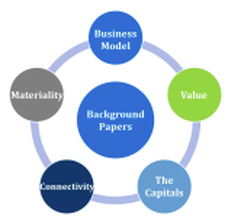
The IIRC will release Version 1.0 of the International <IR> Framework by the end of 2013. Before doing so, from 16 April, the IIRC will conduct a three-month public consultation during which it will call on stakeholders to provide feedback. In preparation for the consultation period, the IIRC established Technical Collaboration Groups* tasked with preparing background papers on key technical topics relating to the Framework. These background papers will be released in February 2013 and will be public documents available on the IIRC website.
Topics included in the background papers are:
*Each Technical Collaboration Group is coordinating its efforts with the following lead organizations: Association of Chartered Certified Accountants (ACCA), the Netherlands Institute of Chartered Accountants (NBA), the Chartered Institute of Management Accountants (CIMA), International Federation of Accountants (IFAC), PricewaterhouseCoopers (PwC), Ernst & Young (EY), American Institute of Certified Public Accountants (AICPA) and the World Intellectual Capital Initiative (WICI). These lead organizations are working with input from participants representing a range of disciplines and countries; as a result, the papers vary in form, style, and type of content. They reflect the collective views of the Group, but not necessarily those of the lead organization or the IIRC.
Read more at www.theiirc.org
Topics included in the background papers are:
- Business Model
- Capitals
- Connectivity
- Materiality
- Value Creation
*Each Technical Collaboration Group is coordinating its efforts with the following lead organizations: Association of Chartered Certified Accountants (ACCA), the Netherlands Institute of Chartered Accountants (NBA), the Chartered Institute of Management Accountants (CIMA), International Federation of Accountants (IFAC), PricewaterhouseCoopers (PwC), Ernst & Young (EY), American Institute of Certified Public Accountants (AICPA) and the World Intellectual Capital Initiative (WICI). These lead organizations are working with input from participants representing a range of disciplines and countries; as a result, the papers vary in form, style, and type of content. They reflect the collective views of the Group, but not necessarily those of the lead organization or the IIRC.
Read more at www.theiirc.org
Businesses believe Integrated Reporting helps to break down silos
Research finds 93% of businesses believe Integrated Reporting helps to break down silos and connect departments
(London November 12, 2012)- A new research report produced by specialist corporate communications agency, Black Sun in association with the IIRC, finds that 93% of businesses that participated in the report believe that moving towards an Integrated Reporting framework helps to breakdown silos between teams and leads to better connected departments. The report ‘Understanding Transformation: Building the Business Case for Integrated Reporting’, tracks the behavioural changes of businesses on their journey towards Integrated Reporting <IR> during the first year of the International Integrated Reporting Council (IIRC)’s Pilot Programme initiative.
Integrated Reporting provides an opportunity for companies to present a holistic and complete picture of the business in a clear, concise, connected and comparable manner. The organizations participating in the research are at different stages but are all involved in the IIRC’s Pilot Programme, which aims to help develop an International Integrated Reporting Framework. The Pilot Programme involves more than 80 private and public organizations in the business network and 25 institutional investors. Drawn from all over the world, participants are trialling the principles, content and practicalities of the Framework to provide feedback and build business momentum towards its implementation. The Black Sun report provides a baseline for follow-up research that will track the progress these organizations are making.
Paul Druckman, CEO of the IIRC commented “It is clear that much of the change to achieve Integrated Reporting needs to be driven by businesses themselves. It is up to them to demonstrate what constitutes good business, and an Integrated Report is an important tool to achieve this. I think that the report by Black Sun highlights this thinking and I am encouraged by its results. The IIRC are looking forward to further shaping the future of the framework with the Pilot Programme participants and welcoming the next phase in our journey towards Integrated Reporting”
Some of the other key findings from the report include:
Read the research report at www.theiirc.org
(London November 12, 2012)- A new research report produced by specialist corporate communications agency, Black Sun in association with the IIRC, finds that 93% of businesses that participated in the report believe that moving towards an Integrated Reporting framework helps to breakdown silos between teams and leads to better connected departments. The report ‘Understanding Transformation: Building the Business Case for Integrated Reporting’, tracks the behavioural changes of businesses on their journey towards Integrated Reporting <IR> during the first year of the International Integrated Reporting Council (IIRC)’s Pilot Programme initiative.
Integrated Reporting provides an opportunity for companies to present a holistic and complete picture of the business in a clear, concise, connected and comparable manner. The organizations participating in the research are at different stages but are all involved in the IIRC’s Pilot Programme, which aims to help develop an International Integrated Reporting Framework. The Pilot Programme involves more than 80 private and public organizations in the business network and 25 institutional investors. Drawn from all over the world, participants are trialling the principles, content and practicalities of the Framework to provide feedback and build business momentum towards its implementation. The Black Sun report provides a baseline for follow-up research that will track the progress these organizations are making.
Paul Druckman, CEO of the IIRC commented “It is clear that much of the change to achieve Integrated Reporting needs to be driven by businesses themselves. It is up to them to demonstrate what constitutes good business, and an Integrated Report is an important tool to achieve this. I think that the report by Black Sun highlights this thinking and I am encouraged by its results. The IIRC are looking forward to further shaping the future of the framework with the Pilot Programme participants and welcoming the next phase in our journey towards Integrated Reporting”
Some of the other key findings from the report include:
- 98% agreed that the shift towards Integrated Reporting leads to a better understanding of how the organization will create value over time; 74% agreed that it will lead to more consistency in external communications.
- 93% agreed that it leads to better quality data collection.
- 64% think that analysts will benefit significantly from Integrated Reporting in future.
- 95% think that employees will benefit.
- 28% are already seeing significant benefit to the Board from Integrated Reporting; 56% expected to see significant benefit to the Board in future, with 97% anticipating positive change overall.
Read the research report at www.theiirc.org
IIRC showcases the business and investor journey towards Integrated Reporting 26 September 2012
|
London (September 26th ) The International Integrated Reporting Committee (IIRC) has marked the first anniversary of the launch of its Pilot Programme by holding a major international conference and publishing a Yearbook which showcases the business and investor journey towards Integrated Reporting.
The Pilot Programme, comprising over 80 organizations and 25 investors from around the globe, is designed to test the principles, content, and practical application of Integrated Reporting <IR> and develop the International <IR> Framework. The Pilot Programme is the IIRC’s innovation hub, encouraging and facilitating an evolution in corporate reporting that will lead to businesses adopting <IR>, supported by institutional investors, regulators and standard setters. Kye Gbangbola attended the kick off meeting on 17 and 18 October 2011 in Rotterdam. The Integrated Reporting Pilot Programme: a two-year programme, launched by the IIRC in September 2011, for a select group of companies who will demonstrate global leadership and the principles and practicalities of Integrated Reporting will be tried and tested, to support the creation a new global standard in Integrated Reporting. |
The IIRC hosted it's first Pilot Programme Conference on 18 and 19 September 2012, at KPMG in Amsterdam, to mark the end of the first year. Kye Gbangbola attended as our UK represent along with 180 companies piloting integrated sustainability reporting. IIRC CEO Paul Druckman said:
‘We call the Pilot Programme our “innovation hub” – made up of people who want to push the boundaries just a little bit further; to challenge, or at least question, orthodox thinking; and to acknowledge the importance of reporting to the way our organizations think and behave.’
Read Paul Druckman’s full speech
‘We call the Pilot Programme our “innovation hub” – made up of people who want to push the boundaries just a little bit further; to challenge, or at least question, orthodox thinking; and to acknowledge the importance of reporting to the way our organizations think and behave.’
Read Paul Druckman’s full speech
The Pilot Programme 2012 Yearbook: Capturing the Experiences of Global Businesses and Investors, profiles the journey many businesses have embarked upon towards communicating coherent, value-relevant information to investors and other stakeholders and describes the progress achieved through shared experiences, lessons learned, and best practices. The Yearbook identifies emerging themes and practices, focusing on technical topics currently under examination, such as business model, capitals, connectivity, materiality, and value.
Read the Pilot Programme 2012 Yearbook
For more details please find a full printable briefing on the Pilot Programme for companies and investors .....here>>
Read more about GRI’s work with integrated reporting.
Read the Pilot Programme 2012 Yearbook
For more details please find a full printable briefing on the Pilot Programme for companies and investors .....here>>
Read more about GRI’s work with integrated reporting.
IIRC publishes Draft Outline of the future Integrated Reporting Framework 01 August 2012
The International Integrated Reporting Council (IIRC) released the Draft Outline of its Integrated Reporting Framework on 11 July 2012. According to the IIRC, the Outline “establishes for the first time the basic structure of the Framework and is intended to keep stakeholders informed as the Framework is developed.” The Framework content is planned to be launched at the end of 2013.
The successful company of tomorrow will have an integrated strategy to achieve financial results and create lasting value for itself, its stakeholders and society. Clear links must be made between a company’s ‘single bottom line’ and the sustainability impacts caused - or the value created -in generating its financial results. The Framework should help those companies producing an integrated report to also integrate sustainability into their strategy.
The process to establish an internationally-accepted Integrated Reporting Framework is in its early days at the IIRC, and has already attracted important players in the corporate reporting field, such as reporting standard setters, large auditing companies, accountancy boards, large companies, financial market institutions, and NGOs.
According to the IIRC, the new Draft Outline aims to keep stakeholders informed of the likely structure and general content of the Framework as work on its development progresses, taking into account:
• Feedback received on the Discussion Paper
• Engagement with the Pilot Programme participants, the Investor Network and others
• Additional research and work being conducted by the IIRC Secretariat
Other details on the technical content are expected to be released in late 2012, followed by a draft Framework for public consultation in early to mid-2013. ‘Version 1.0’ of the Framework will be released in late 2013.
The IIRC welcomes feedback from stakeholders on the outline proposal – feedback should be sent to [email protected].
GRI’s work on integrated reporting
Understanding the links between financial results and sustainability impacts is critical for business managers, and increasingly connected to long and short-term business success. To understand these links, organizations must identify the material sustainability topics to monitor and manage to ensure the business survives and expands. This step is at the core of the sustainability reporting process provided by GRI’s Sustainability Reporting Framework.
The sustainability reporting process defined by the GRI Sustainability Reporting Framework can help companies that want to produce integrated reports in three main ways:
• Identifying material topics – topics that express the core link between business goals and sustainability impacts
• Stakeholder engagement – dialogue to help determine material impacts and manage risks and opportunities
• Performance indicators – measuring, managing and reporting material issues using an internationally accepted framework
Many organizations that use the GRI Guidelines have started experimenting in the field of integrated reporting despite the absence of an internationally-accepted definition and framework. To know more about these companies, see the Sustainability Disclosure Database.
GRI is now developing the next generation of Sustainability Reporting Guidelines – G4 – which will be launched in May 2013 during GRI’s Global Conference on Sustainability and Reporting. In June 2012 GRI published an Exposure Draft of G4 for public consultation.
One of the G4 development objectives set by GRI’s Board of Directors is to offer guidance on ‘how to link the sustainability reporting process to the preparation of an integrated report aligned with the guidance to be developed by the International Integrated Reporting Council (IIRC)’. The G4 Exposure Draft does not include such guidance at this time, as it was not possible due to the differing timelines between the development process of G4 and that of the IIRC’s Integrated Reporting Framework. However, GRI remains committed to providing such guidance in due course.
GRI is also planning a publication for release in May 2013 discussing the existing examples of organizations that have experimented with using the GRI Sustainability Reporting Guidelines and the preparation of integrated reports.
Read more about GRI’s work with integrated reporting.
The successful company of tomorrow will have an integrated strategy to achieve financial results and create lasting value for itself, its stakeholders and society. Clear links must be made between a company’s ‘single bottom line’ and the sustainability impacts caused - or the value created -in generating its financial results. The Framework should help those companies producing an integrated report to also integrate sustainability into their strategy.
The process to establish an internationally-accepted Integrated Reporting Framework is in its early days at the IIRC, and has already attracted important players in the corporate reporting field, such as reporting standard setters, large auditing companies, accountancy boards, large companies, financial market institutions, and NGOs.
According to the IIRC, the new Draft Outline aims to keep stakeholders informed of the likely structure and general content of the Framework as work on its development progresses, taking into account:
• Feedback received on the Discussion Paper
• Engagement with the Pilot Programme participants, the Investor Network and others
• Additional research and work being conducted by the IIRC Secretariat
Other details on the technical content are expected to be released in late 2012, followed by a draft Framework for public consultation in early to mid-2013. ‘Version 1.0’ of the Framework will be released in late 2013.
The IIRC welcomes feedback from stakeholders on the outline proposal – feedback should be sent to [email protected].
GRI’s work on integrated reporting
Understanding the links between financial results and sustainability impacts is critical for business managers, and increasingly connected to long and short-term business success. To understand these links, organizations must identify the material sustainability topics to monitor and manage to ensure the business survives and expands. This step is at the core of the sustainability reporting process provided by GRI’s Sustainability Reporting Framework.
The sustainability reporting process defined by the GRI Sustainability Reporting Framework can help companies that want to produce integrated reports in three main ways:
• Identifying material topics – topics that express the core link between business goals and sustainability impacts
• Stakeholder engagement – dialogue to help determine material impacts and manage risks and opportunities
• Performance indicators – measuring, managing and reporting material issues using an internationally accepted framework
Many organizations that use the GRI Guidelines have started experimenting in the field of integrated reporting despite the absence of an internationally-accepted definition and framework. To know more about these companies, see the Sustainability Disclosure Database.
GRI is now developing the next generation of Sustainability Reporting Guidelines – G4 – which will be launched in May 2013 during GRI’s Global Conference on Sustainability and Reporting. In June 2012 GRI published an Exposure Draft of G4 for public consultation.
One of the G4 development objectives set by GRI’s Board of Directors is to offer guidance on ‘how to link the sustainability reporting process to the preparation of an integrated report aligned with the guidance to be developed by the International Integrated Reporting Council (IIRC)’. The G4 Exposure Draft does not include such guidance at this time, as it was not possible due to the differing timelines between the development process of G4 and that of the IIRC’s Integrated Reporting Framework. However, GRI remains committed to providing such guidance in due course.
GRI is also planning a publication for release in May 2013 discussing the existing examples of organizations that have experimented with using the GRI Sustainability Reporting Guidelines and the preparation of integrated reports.
Read more about GRI’s work with integrated reporting.
Contact Us Booking Sponsorship & Advertising Opportunities
Copyright © 2002 - 2023 Total eco Management Limited. All Rights Reserved' on the site.
Total eco Management Limited is not responsible for the contents or reliability of the linked websites and does not necessarily endorse the views expressed within them. Listing shall not be taken as endorsement of any kind. We cannot guarantee that these links will work all of the time and we have no control over availability of the linked pages. All explanation text on this page was taken from the linked websites.
Copyright © 2002 - 2023 Total eco Management Limited. All Rights Reserved' on the site.
Total eco Management Limited is not responsible for the contents or reliability of the linked websites and does not necessarily endorse the views expressed within them. Listing shall not be taken as endorsement of any kind. We cannot guarantee that these links will work all of the time and we have no control over availability of the linked pages. All explanation text on this page was taken from the linked websites.




